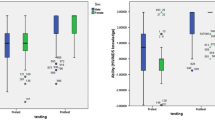Abstract
Measures of HIV/AIDS knowledge and risk perception are important because they are often linked to behavioral change both in theory and in practice. This study examines knowledge and risk perception by assessing their relationship with demographic characteristics, first source of HIV/AIDS information, and behavioral and cognitive risk exposures among men and women in a rural district of Malawi. The data come from a panel study of 940 women aged 15–34 years and 661 men aged 20–44 years. Descriptive statistics and multivariate regression models are used for the analysis. The results indicate that knowledge of HIV/AIDS does not necessarily translate into perceived risk. In addition, there appears to be a gender difference in the influence of cognitive and behavioral factors on perceived risk.
Similar content being viewed by others
References
Bandawe, C. R., and Foster, D. (1996). AIDS-related beliefs, attitudes and intentions among Malawian students in three secondary schools. AIDS Care, 8, 223-232.
Demographic and Health Survey. (2001). Malawi 2000. Calverton, MD: ORC Macro and Malawi National Statistical Office.
Gregson, S., Zhuwau, T., Anderson, R. M., and Chandiwana, S. K. (1998). Is there evidence for behaviour change in response to AIDS in rural Zimbabwe? Social Science and Medicine, 46, 321-330.
Hankins, C. (1998). Changes in patterns of risk. AIDS Care, 10, s147-153.
Hunter, S., and Williamson, J. (2000). Children on the brink. Updated estimates and recommendations for intervention. Washington, DC: The Synergy Project and USAID.
Kengeya-Kayondo, J. F., Carpenter, L. M., Kintu, P. M., Nabaitu, J., Pool, R., and Whitworth, J. A. G. (1999). Risk perception and HIV-1 prevalence in 15,000 adults in rural south-west Uganda. AIDS, 13, 2295-2302.
Lagarde, E., Pison, G., and Enel, C. (1996). Knowledge, attitudes and perception of AIDS in rural Senegal: Relationship to sexual behaviour and behaviour change. AIDS, 10, 327-334.
Lagarde, E., Pison, G., and Enel, C. (1997). Improvements in AIDS knowledge, perceptions and risk behaviours over a short period in a rural community of Senegal. International Journal of STD and AIDS, 8, 681-687.
Lindan, C., Allen, S., Carael, M., Nsengumuremyi, F., Van de Perre, P., Serufilira, A., Tice, J., Black, D., Coates, T., and Hulley, S. (1991). Knowledge, attitudes, and perceived risk of AIDS among urban Rwandan women: Relationship to HIV infection and behavior change. AIDS, 5, 993-1002.
Miller, K., Zulu, E. M., and Watkins, S. C. (2001). Husband–wife survey responses in Malawi. Studies in Family Planning, 32, 161-174.
Montano, D. E., Kasprzyk, D., and Taplin, S. H. (1997). The theory of reasoned action and the theory of planned behavior. In K. Glanz, F. M. Lewis, and B. K. Rimer (Eds.), Health behavior and health education (pp. 85-112). San Fransisco: Jossey-Bass.
Nzioka, C. (1996). Lay perceptions of risk of HIV infection and the social construction of safer sex: Some experiences from Kenya. AIDS Care, 8, 565-579.
Poppen, P. J., and Reisen, C. A. (1997). Perception of risk and sexual self-protective behavior: A methodological critique. AIDS Education and Prevention, 9, 373-390.
Prochaska, J. O., Redding, C. A., Harlow, L. L., Rossi, J. S., and Velicer, W. F. (1994). The transtheoretical model of change and HIV prevention: A review. Health Education Quartly, 21, 471-486.
Spira, R., Lagarde, E., Bouyer, J., Seck, K., Enel, C., Toure Kane, N., Piau, J.-P., Ndoye, I., Mboup, S., and Pison, G. (2000). Preventative attitudes towards the threat of AIDS: Process and determinants in rural Senegal. AIDS Education and Prevention, 12, 544-556.
Strecher, V. J., and Rosenstock, I. M. (1997). The health belief model. In K. Glanz, F. M. Lewis, and B. K. Rimer (Eds.), Health behavior and health education (pp. 41-59). San Fransisco: Jossey-Bass.
Tyndall, M. W., Agoki, E., Malisa, W., Ndinya-Achola, J. O., Ronald, A. R., and Plummer, F. A. (1994). Sexual behavior and perceived risk of AIDS among men in Kenya attending a clinic for sexually transmitted diseases. Clinical Infectious Diseases, 19, 441-447.
UNAIDS/WHO Working Group on Global HIV/AIDS and STI Surveillance. (June 2000). Epidemiological fact sheet on HIV/AIDS and sexually transmitted infections, 2000 update. Accessed 18 June 2002 at: http://www.unaids.org/hivaidsinfo/statistics/june00/fact___sheets/pdfs/malawi.pdf
Author information
Authors and Affiliations
Corresponding author
Rights and permissions
About this article
Cite this article
Barden-O'Fallon, J.L., deGraft-Johnson, J., Bisika, T. et al. Factors Associated with HIV/AIDS Knowledge and Risk Perception in Rural Malawi. AIDS Behav 8, 131–140 (2004). https://doi.org/10.1023/B:AIBE.0000030244.92791.63
Issue Date:
DOI: https://doi.org/10.1023/B:AIBE.0000030244.92791.63




